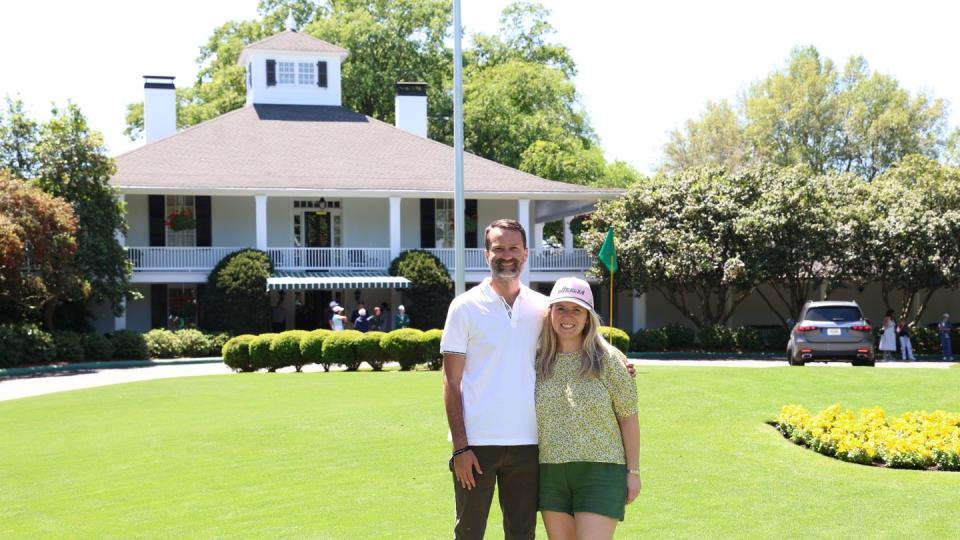‘I Unplugged For 2 Days And Rediscovered The Joy Of Watching Sports’

I’ve spent a decent amount of time watching sports over the years—cheering on my beloved (and beleaguered) Northwestern Wildcats football team, clutching my chest during Simone Biles’ record-breaking vaults, and rooting for Caitlin Clark and Angel Reese during their epic NCAA runs.
So when I got the opportunity to go to the Masters Tournament in Augusta, Georgia, as a guest of Mercedes-Benz, I jumped at the opportunity. Between Netflix’s Full Swing, and the fact that I live on a golf course, watching people tee off right outside my window all day, I was pumped to spectate in person—and watch Scottie Scheffler attempt to make his way toward a historic second win.
There was one catch: Augusta National Golf Club, where the Masters Tournament is held every year, famously bans cell phones (and any electronic devices) from the property. Get caught with a phone and you’ll be swiftly escorted outside the gates—whether you’re a CEO, famous actor, or just a patron.
Of course I knew I’d survive without Instagram for the day, and probably be better for it.
But I also have a 1-year-old who I’d be leaving at home for the first extended period of time since he was born. Still, it was an opportunity I didn’t want to pass up, so I packed my bags and prepared to hit the greens.
As my husband and I got ready to head to the course—we had tickets to the final two days of the tournament—I stared anxiously at the cell phone on my bedside table. To say I dreaded leaving it behind would be an understatement.
Yet that day, my husband and I walked all 18 holes of Augusta National, enjoyed the azaleas (the flower…and the cocktails) and pimento cheese sandwiches the golf course is famous for, and immersed ourselves in following and rooting on various players. I'm going to be honest: I did not miss my phone at all. A few check-in phone calls via old school land lines located throughout the course eased any worries I had about my son. And as the day progressed, I felt a sense of levity I hadn't experienced in months.

The psychological benefits of watching sports—especially unplugged—are very real.
“Spectators experience dopamine hits through the joy of winning, oxytocin is released when connecting with others in person—that’s sometimes referred to as the bonding hormone—and of course, there are endorphins from the excitement of being at a live event, wrapped in the suspense of a close game,” says Dr. Shannen Reece, PhD, a sports psychologist based in Naples, Florida.
It’s also a source of stress relief—giving you a temporary break from life. “It hijacks the brain in a sense, pulling you away from normal day-to-day challenges, any stressors you might be experiencing,” she says. “And by doing that it has a relaxing effect, a sense of catharsis and even a physical release when people are cheering, clapping, and jumping up and down.”
A highlight was when we found ourselves immediately adjacent to a golf ball that Australian player Jason Day hit into the woods. We watched alongside a small group of spectators as Day pondered his shot. When it became clear he planned to hit the ball directly through the trees ahead of him, I prepared to duck and cover. But when the ball sailed above the canopy and toward the green, we all cheered and bonded over our good luck at witnessing, from mere inches away, the skills of a professional athlete at that level.
The camaraderie was enhanced by the fact that not a single person was attempting to take a selfie with Day in the background.

On the final day of the tournament, the energy on the course was contagious.

That morning, my husband and I got the chance to drive a Mercedes-Benz AMG G 63 up the famous Magnolia Lane, typically only accessible to players and Augusta National members. (A mindfulness experience in itself—as the car's heated and massaging seats set the vibe for taking in the once-in-a-lifetime views.) As we drove, we talked about the experience of going unplugged the day prior. We both agreed that going tech-free while soaking in live sports was a phenomenal way to mentally reset.
It was far more enjoyable to me than meditation (something I struggle with), and Reece confirmed the benefits.“When you are allowing yourself to be present, and there are no other distractions around, [watching sports] is definitely a mindful activity,” says Reece.
Later on, we snagged seats on the 18th hole, and watched as some players birdied and others missed putts. One of the most unexpectedly exciting elements was watching the giant scoreboard be manually updated as each pairing finished a hole. Thanks to the complete lack of screens, there was no other way to know what was going on.
Cheering on an athlete or team can give you “a sense of pride and joy as you feel you’re part of something bigger than yourself,” says Reece—and I found myself getting chills, despite the heat of the day, with every roar of the crowd.
By the time Scottie Scheffler locked in his win, I was surprised to find myself in no hurry to get back to my phone. Instead, I was basking in the early evening Georgia light, feeling mentally refreshed, and envisioning myself absolutely crushing it during my next round of mini golf.
You Might Also Like

 Yahoo Sport
Yahoo Sport 






































